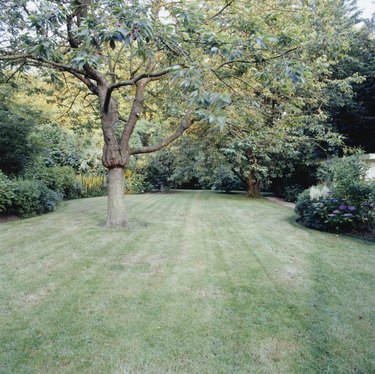Things You'll Need
Garden hose
Cardboard or sheet
Herbicide
Grass seed
Lawn mower
Lawn fertilizer

An easy-to-grow matting ground cover, perfect under trees, on slopes and between pavers in U.S. Department of Agriculture plant hardiness zones 5 through 9, blue star creeper (Isotoma fluviatilis or Laurentia fluviatilis) is just as its name implies -- creeping. If this perennial spread into your lawn where it is not wanted, it has become a weed. Like any other weed, physical and chemical removal methods can be used to kill it. Then, ensure it doesn't grow back so you can enjoy a lawn that is lush and free of unwanted plants.
Step 1
Water the lawn with 1/2 to 1 inch of water where the blue star creeper is growing. Lift up the plant and grab it at the base. Pull to remove the roots from the soil, and move your hand to the next section and continue pulling until the matted plant is removed completely from the soil. Sift through the bare soil area and remove any stray roots to ensure the plant is eradicated from the lawn. Throw away all pieces of this plant.
Video of the Day
Step 2
Cover the grass growing around the blue star creeper with a sheet, cardboard or another protective shield. Spray the foliage of the unwanted plant, on a dry, calm day, with a nonselective herbicide, such as a ready-to-use glyphosate product. Ideally, perform this task in spring before the plant sets seed, but any time during active growth usually works well. Pull the blue star creeper from the ground after it dies back, usually in five to 14 days.
Step 3
Overseed the area where the blue star creeper was growing with the desired grass seed, keeping the area moist for the first growing season. Wait two to four weeks for this task if you used an herbicide. If the blue star creeper sprouts, pull them, along with the roots, from the ground immediately and discard.
Step 4
Maintain a healthy lawn that discourages and chokes out weeds and unwanted plants. For example, mow grass at a proper height for its kind, often 2 or 3 inches, removing no more than one-third of the grass height at any one mowing. Also, keep the lawn well-watered. In summer, it may need 2 or more inches of water a week to thrive. Adopt a good fertilization program as well. Typically, before a watering, broadcast 1/2 to 1 pound of a lawn fertilizer evenly over 1,000 square feet area in early spring, late spring, early fall and again in late fall. If you used a lawn fertilizer with a 20 as the first nutrient ratio, you will need to apply 5 pounds of such fertilizer to equal 1 pound of nitrogen.
Video of the Day